Step into your next adventure with the best camper WiFi for RV trips! Staying connected is key when on the go, so ensure you have the latest and greatest technology to make your adventure unforgettable.
For many, campervan and RV WiFi has become more of a necessity than a nice-to-have.
If you use your van to seek a few days off-grid, internet access is probably the last thing you want or need.
But when living long-term in your van, your needs will probably differ.
You might need to work online, stream music, or binge on Netflix occasionally. These all need a decent RV WiFi connection.
Even checking emails once a day and keeping in touch with family and friends on social media needs some internet access.
There are a few ways to get internet in your campervan vehicle and plenty of jargon, so it can all be a bit confusing.
In this post, we’ll spell it out so you can choose the best RV WiFi system for your lifestyle.
This post isn’t especially techie, but there are some terms you may not have come across before. So, we’ve included a simple glossary of terms at the end of this post.
What Is RV WiFi?
RV WiFi is much the same as any other WiFi and provides a wireless connection to the internet.
Typically, in a house, you connect a router to the internet through a landline. The router broadcasts a WiFi signal. Any WiFi-enabled device within range can connect to it, using the signal to access the internet.
There’s no landline in an RV, campervan, or motorhome to connect the router to, so an alternative solution is needed.
How Will You Use the Internet In Your Camper?
There are several RV internet options we’ll discuss below. But before we launch straight into that, take a moment to consider how you’ll use the internet in your RV.
By taking stock of your needs and how you’ll use the internet, you can determine the best solution for you.
Are you a digital nomad? Depending on income from remote working requires a reliable solution, even if it costs a little more.
Do you want to stream video and music on demand? Again, you’ll need a decent and reliable WiFi signal, though if it’s not 100%, it probably isn’t the end of the world.
Maybe you just want to check emails once a day and browse your social media channels. Your usage isn’t heavy, so you might not see this as critical, so you can get away with a cheaper, or even free, WiFi solution.
Internet options vary in cost. Weigh up the features each provides against the upfront and ongoing costs to help you choose the best RV WiFi solution.
RV Internet Options
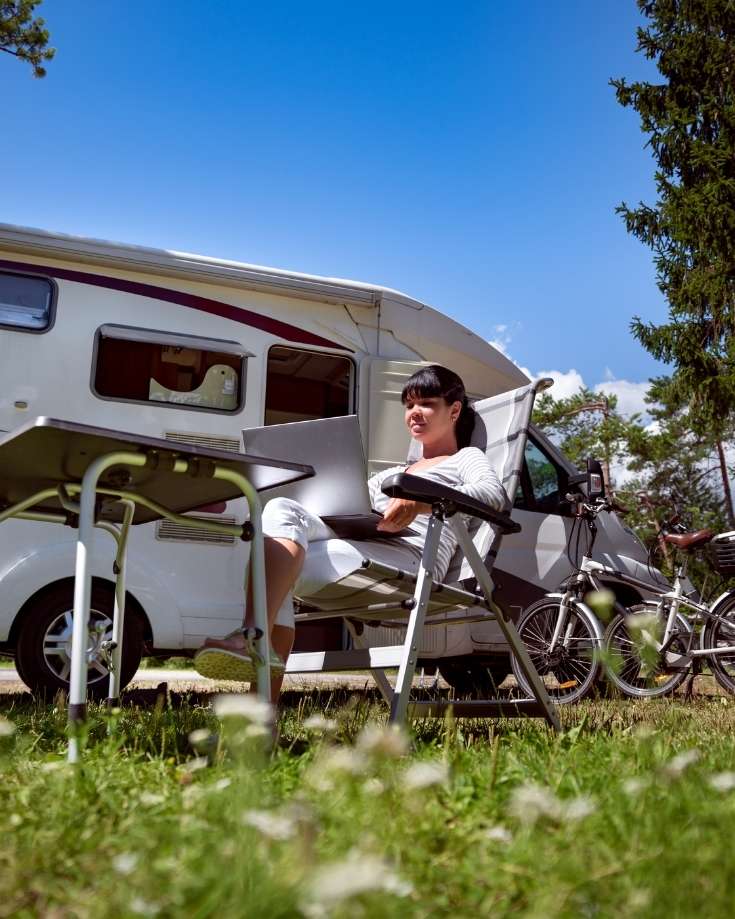
You can’t install a fixed telephone line in your RV, campervan, or motorhome. So, you need an alternative RV WiFi solution to get an internet connection.
The best RV internet option depends on your needs, lifestyle, and budget.
There are four mobile internet options:
- Free WiFi hotspots in your RV
- RV park and campground WiFi
- Mobile WiFi with wireless service providers
- Satellite WiFi for RVs
We’ll look at each of these options in detail, the gear needed and the pros and cons, and more.
Free Public RV WiFi Hotspots
At A Glance
Pros
- Widely available
- Easy access
- Free or low cost
Cons
- Not ideal for remote areas
- Unreliable quality
- Flaky security
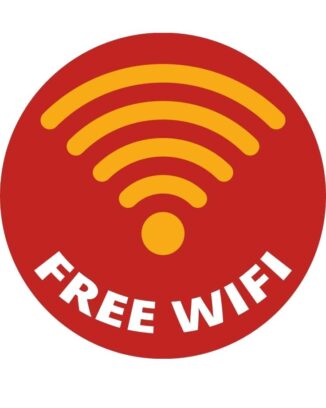
If you don’t need a reliable internet connection and only occasional access, you could use free public WiFi hotspots.
Free WiFi hotspots are widely available, including:
- fast food outlets,
- coffee shops,
- supermarkets,
- malls,
- train stations, and
- hospitals.
Though primarily free, you are often expected to trade your email address for access.
Public WiFi rarely offers high-speed connectivity, so probably not the best solution if you want to download movies.
The range of each hotspot varies too, so unless you strike it lucky with your parking location, you may not be able to get access from your RV.
But suppose you need to check your emails, update your social media, and don’t want to use your cell data. In that case, these free hotspots offer a convenient and best RV WiFi solution.
If this is an option you’re most likely to opt for, make sure to read the section below about security.
How To Connect To Free Public WiFi Hotspots
Connecting to public WiFi hotspots is easy.
- Enable WiFi in your device’s WiFi settings.
- Available WiFi hotspots will appear in a list. Open wifi networks that don’t need a password won’t have the little padlock you can see circled in the image below.
- Choose your network. Some will take you to a landing page where you may need to enter an email address. Others will connect you right away.
RV Park & Campground WiFi
At A Glance
Pros
- Widely available
- Easy access
- Free or low cost
Cons
- Not ideal for remote areas
- Unreliable quality
- Flaky security
Most RV parks and campgrounds offer WiFi facilities now.
Some are marketed as free and included in the pitch fees. Others may charge a premium, so only those that want the service need to pay.
Some campgrounds offer a mix. A free connection is available in WiFi zones, usually close to the reception, and a paid option for a higher speed connection.
In our experience, all campground WiFi is hit and miss.
Large campgrounds need long-range WiFi to get a decent signal across the entire site.
For some reason, not all campgrounds install antennas, routers, and access points capable of the task. The upshot is a poor signal in some areas of the campground.
Throw a few trees into the mix and the solid walls of your RV, and getting a usable signal to your device is a tall ask.
Even in zones where the signal is good, WiFi speed will slow considerably if the frequency is congested with other users and devices.
Just try using the internet first thing in the morning when the entire campground wakes up. Then, when lots of people want to see what’s been happening in the world overnight, with their morning coffee, forget it!
In our experience, campground WiFi alone won’t cut it if you rely on the internet for your income or can’t live without a good connection.
Fortunately, there are ways to improve the situation.
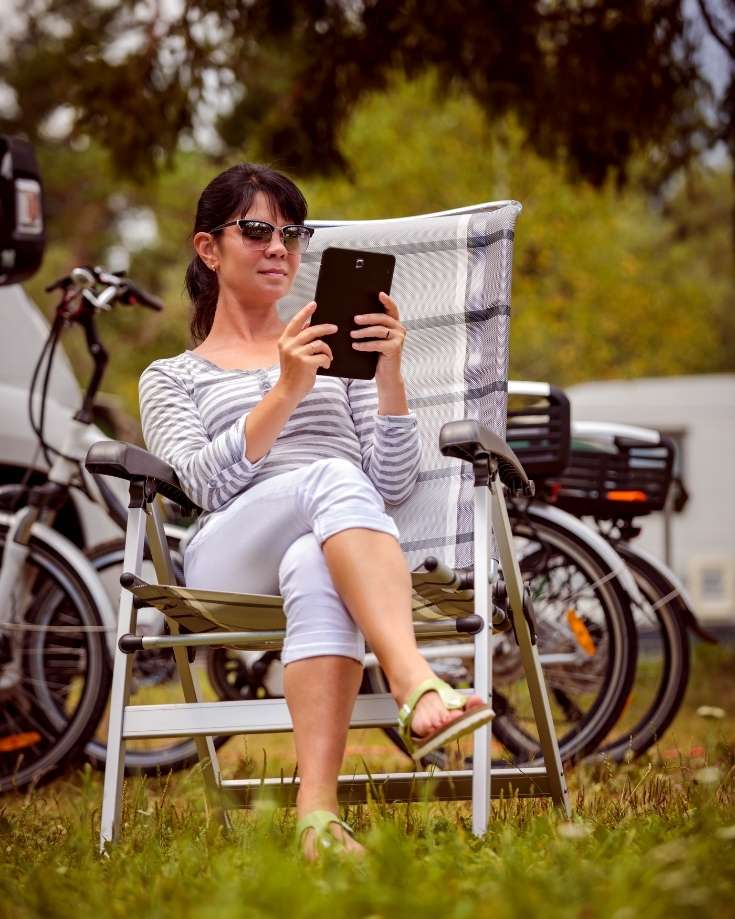
RV Wifi Boosters
An RV WiFi booster does precisely what its name suggests. It takes an existing WiFi signal and boosts it.
They’re often referred to by different names, including WiFi extender, WiFi booster, range repeater, and range extender.
They have the same objective, though: to boost the WiFi signal though they do it in slightly different ways.
A WiFi booster can extend the range depending on the type you buy. It enables the signal to reach your RV and amplifies it, making it more usable.
A booster kit includes an external antenna, an internal antenna, a booster pack, and a power supply.
The best WiFi boosters use omnidirectional antennas mounted on the roof. Some of the more budget-friendly options use a directional antenna or even a panel antenna, ideal for keeping your van life costs down.
These need to be pointed towards a cell tower or the public WiFi route to pick up the best signal, offering a less flexible solution.
High-end WiFi boosters are pretty clever too.
You can configure them to use available WiFi signals depending on your specified rules. For example, let’s say you have a cellular data plan (more on that below) and access to public or campground WiFi.
You can configure the WiFi booster and set the priorities to connect to the lowest-cost network first.
It’s worth bearing in mind that this device is a signal booster. It can take weak signals and improve them to an extent, but it can’t generate a signal where there is none.
Mobile WiFi With Wireless Service Providers
At A Glance
Pros
- Widely available through cell service providers
- Great solution where no other WiFi solution is available
- Mobile, so stay connected on the road
- It can be super fast
- Private, more secure connection
Cons
- Unlimited data plans can be costly
- Dependant on cell signal
The most popular RV internet option by far, mobile WiFi is a great all-around solution for full-time RVers.
With a data plan from your cell phone provider, you can access the internet from your smartphone and turn it into a personal mobile hotspot device.
Creating a personal WiFi hotspot turns your phone into a mobile access point. You can then tether other WiFi-enabled devices to your phone, using its internet access and data.
Service Providers
Cellular service providers, or carriers, offer a range of data plans for mobile internet access. When comparing plans, it’s important to consider all the features and especially any limitations.
Here are a few crucial things to look for when assessing if a data plan will meet your mobile internet needs:
- Text & call coverage
- 4G LTE coverage
- High-speed caps
- Data usage limits & throttling
- Unlimited data plans
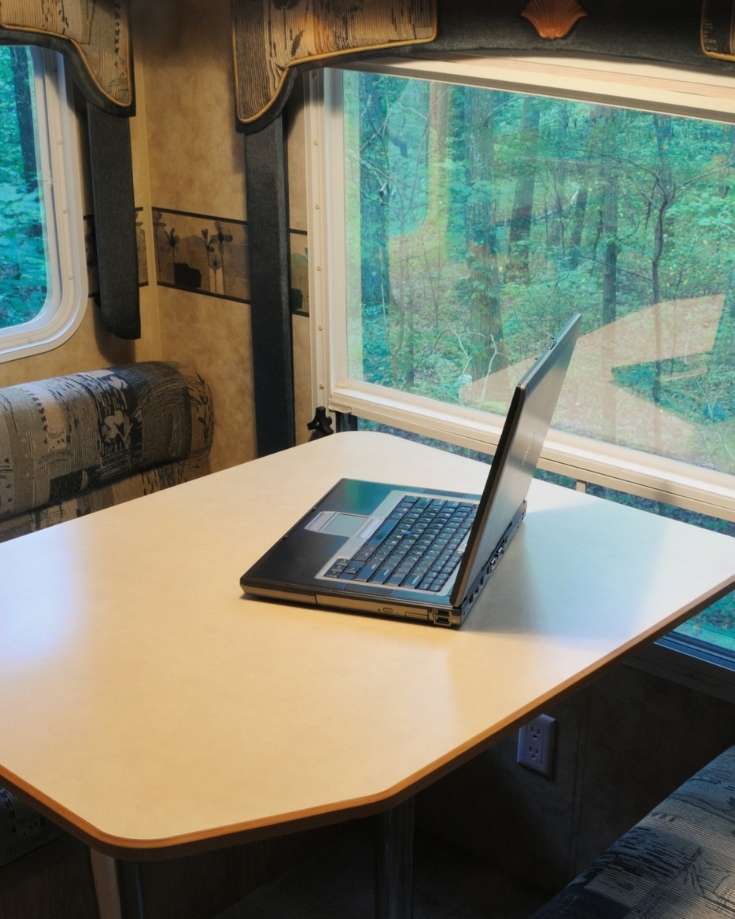
Verizon
Verizon is one of the most popular service providers of unlimited plans used by full-time RVers in the US.
Offering four unlimited plans:
- Start Unlimited,
- Play More Unlimited,
- Do More Unlimited, and
- Get More Unlimited,
their 4G LTE coverage is excellent. All plans include 5G connectivity where available.
Prices range from around $70 per month, and discounts on additional lines are available.
Mexico and Canada’s talk, text, and data are included in their plans. However, data speeds are throttled after a certain level of use.
Check out their latest plans here and their coverage map here.
T-Mobile
Giving Verizon a run for its money on price, T-Mobile is a serious contender for RVers who don’t rely on internet access when in remote areas.
While T-Mobile’s coverage isn’t quite up to that of Verizon, they offer less expensive plans with unlimited data.
They have plans that include unlimited 5G & 4G LTE data, Netflix, and all taxes and fees included.
Also offering discounts on multiple lines, T-Mobile provides different throttling levels. Make sure to take your data needs into account when comparing packages. If you regularly use over 100GB a month, you should probably opt for their Magenta MAX plan.
Check out T-Mobile’s latest plans here and their coverage map here.
AT&T
From our research, we can see many customers are happy with AT&T’s unlimited plans.
Undoubtedly, their coverage is as good as Verizon’s.
However, it seems AT&T’s current plan availability isn’t as good for full-time RVers who need plenty of data.
Their unlimited data plans limit how much data can be used when tethered. The smallest plans prohibit the use of tethering altogether.
Depending on use, you may need to invest in WiFi booster hardware and prepaid data plans or add a hotspot router as a second line.
Check out AT&T’s latest plans here and their coverage map here.
Mobile Routers For RVs

The downside of tethering devices to your phone is that it drains your battery quickly. To avoid this, either keep your phone attached to a power supply or use a MiFi router.
A MiFi router acts much like your cell phone’s internet access. It receives an internet signal the same way, but it doesn’t have calling and text capabilities.
Because the router is a separate device, you don’t need to run the battery down on your phone.
You can connect multiple devices to the router at the same time too.
Set up all your devices to connect to the router. When you switch between WiFi networks (say, from your cellular data to a public WiFi connection), you only need to change the connection at the router.
One of the main benefits of using a separate router instead of your phone is they provide a much stronger WiFi signal. It makes them a good option for larger RVs and motorhomes.
Consider using routers that are unlocked and have no geographical limitations, if you travel abroad.
They don’t restrict you to a specific service provider. Then you can switch if better packages become available or use local data SIM cards to gain internet access abroad.
For some reason beyond us, finding unlocked routers is almost impossible – at least, we haven’t found one yet. So if you spend long periods abroad, using your cell phone as a mobile hotspot with a local SIM card is probably your best international option.
Some of the best mobile routers include:
- Netgear’s Nighthawk LTE Mobile Hotspot Router – ideal if you’re with AT&T.
- Verizon Jetpack MiFi 8800L – one of the most highly rated routers on the market.
- Skyroam Solis Lite – great for international roaming.
You can buy them outright or rent them as part of your cellular data plan if you only need them for short trips.
While 4G LTE coverage is good across the US, there are undoubtedly other remote regions where weak signals can be expected.
Reliable connectivity depends on signal strength. If an internet connection is critical and you expect to be in National Parks or remote areas, you may benefit further from a WiFi booster.
Satellite WiFi For RVs
At A Glance
Pros
- Available everywhere
Cons
- Costly (at least for now)
- Slow (at least for now)
- Bulky gear (at least for now)
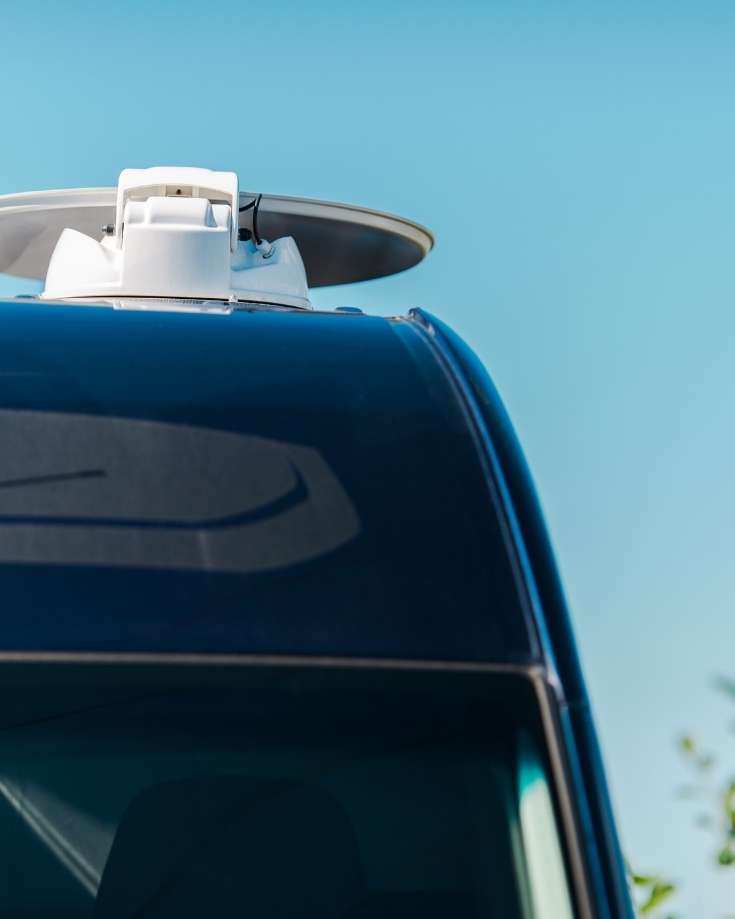
So far, all the RV internet options on our list have one thing in common: they’re not 100% reliable.
In a world where remote working is becoming the norm and van life and RV living is on-trend, this can feel like an unnecessary compromise.
And guess what? With deep enough pockets, you can eliminate this.
Satellite internet for RVs has been around for a while.
With the press of a couple of buttons, a roof-mounted satellite dish deploys and automatically searches for a satellite signal.
The upside is they take up no additional storage space. The downside is you’ll need to park where trees or other obstacles don’t impede the signal.
Tripod-mounted satellite dishes are a less costly alternative, but the kit takes up storage space. You’ll need to consider security too, when you leave it unattended.
Sadly, satellite WiFi was much slower than cellular alternatives. Plus, the initial outlay and monthly costs were high.
But that’s all changing!
Thanks to Elon Musk’s SpaceX program, Starlink Roam RV WiFi is here!
Starlink satellites orbit much closer to Earth than traditional satellites. Much closer! This means the communication speed is way faster. As more satellites are deployed, that speed is only set to improve further.
Promising:
- high-speed internet access,
- no tiered pricing, and
- a small roof-mounted satellite dish,
StarLink has already become the digital nomad’s dream come true.
High-speed internet access in the middle of nowhere!
WiFi Security
Security is a potential issue on public, shared WiFi networks like coffee shops and campgrounds.
At worst, a hacker could compromise the WiFi network. So, avoid using your credit card or transmitting any other sensitive information.
If you use public WiFi a lot, there are ways to protect yourself.
Enable the ‘Always Use HTTPS’ option on websites you regularly use. You’ll find this setting somewhere on most websites that need a logon.
You can improve the security of public WiFi hotspots by using a VPN.
A Virtual Private Network (VPN) can still be hacked, but any data stolen would be heavily encrypted, making you less of a target.
There are several VPNs available, but rather than opting for the cheapest, consider speed first. A VPN can slow down use. When using public WiFi, often already a slow connection, adding a cheap VPN may make use frustrating.
We recommend using a VPN designed for streaming and without data limits.
We currently use NordVPN but have also used ExpressVPN. Both of these are well-known providers, but there are others too.
Tips For Good RV WiFi Signal While Camping
Having an excellent RV WiFi setup means we can run our blog on road trips, uploading photos and videos. In addition, we can FaceTime our family and friends and binge on our favorite Netflix series on demand.
If you’re anything like us, the best solution for your RV WiFi will be a combination of the internet options available.
We use local SIM cards but aim to use different carriers. So, where one provider’s signal is weak, the other often makes up for it.
A WiFi booster helps on campgrounds where the signal isn’t terrific, and when we’re in the middle of nowhere, we pine for SpaceX’s success!
RV WiFi Terminology Explained
Here’s a very light explanation of some WiFi terminology.
Bandwidth
This describes the maximum data transfer rate of the WiFi connection and is expressed in Mbps.
Hotspot
This is the physical location where you connect to the internet. You may see these called WiFi zones around campgrounds or in coffee shops.
Mbps
Acronym for megabits per second. It is how a WiFi network’s speed is expressed. Typically, the higher the number, the faster the connection.
Router
A router is a device that directs the traffic on the WiFi network. It allows you to:
- access the internet,
- send and receive emails,
- print wirelessly, and
- share files and other resources with connected devices.
Tethering
This is a simple way of turning a device with a WiFi connection into a mobile hotspot. For example, say you have a WiFi connection on your smartphone but not your laptop. By switching on the tethering feature on your phone, you can tether your laptop to it, sharing its WiFi signal.
Throttling
Service providers can slow the speed of your internet connection. Service providers can slow the speed of your internet connection. An irritating behavior is that many unlimited plans begin slowing the connection once you reach a specific data usage limit. Many also throttle their speeds during busy periods.
Unlimited Data
Service provider data plans vary, and a popular choice for RVers is an unlimited plan. This describes how much data you can use on your monthly subscription. Watch out, though. Many unlimited plans throttle data or limit how much can be used when tethered.
VPN
A Virtual Private Network (VPN) cloaks your device’s IP address, so all your online activity is anonymous. It is especially useful when using unsecured WiFi networks such as campgrounds, coffee shops, co-working spaces, or those freely available to the public.
Wireless Frequencies
The difference between 2.4 GHz and 5 GHz wireless frequencies is in coverage and bandwidth. 2.4 GHz WiFi has better coverage but is slow compared to 5 GHz. In real terms, you can download and upload files much faster on a 5 GHz frequency, but you need to be positioned closer to the router to pick up its signal.
So, whether you’re a weekend warrior or a full-time van dweller, we hope this article has helped you decide on the best campervan WiFi for your needs. Have we missed anything? Let us know in the comments below!
In Conclusion
There you have it! With these tips, you’re all set to maximize your RV WiFi experience during your next vacation and have an amazing time exploring the country.
Getting WiFi for RV trips has never been easier or more accessible. With some preparation and knowledge, you’ll be ready for your next adventure.
Here’s to staying connected on the go this year!
We would love to hear your thoughts and experiences on getting internet in an RV. Do you use WiFi on your RV trips? What tips do you have for others? Leave a comment below to share your story and help other travelers get the most out of their RV trips!
Angela Devaney

Angela Devaney, a former IT project management professional, embarked on an adventurous journey of full-time travel, which included touring West Africa in a converted overland truck and converting an ex-military 4×4 Sprinter van into a camper for a five-year South American expedition. She now utilizes her hands-on experience to create practical RV living and van life advice as a full-time digital media producer, reaching over a million users annually through her YouTube channel, blog, and newsletter. Angela also lends her expertise as the editor-in-chief of the Campervan Electrics Handbook.


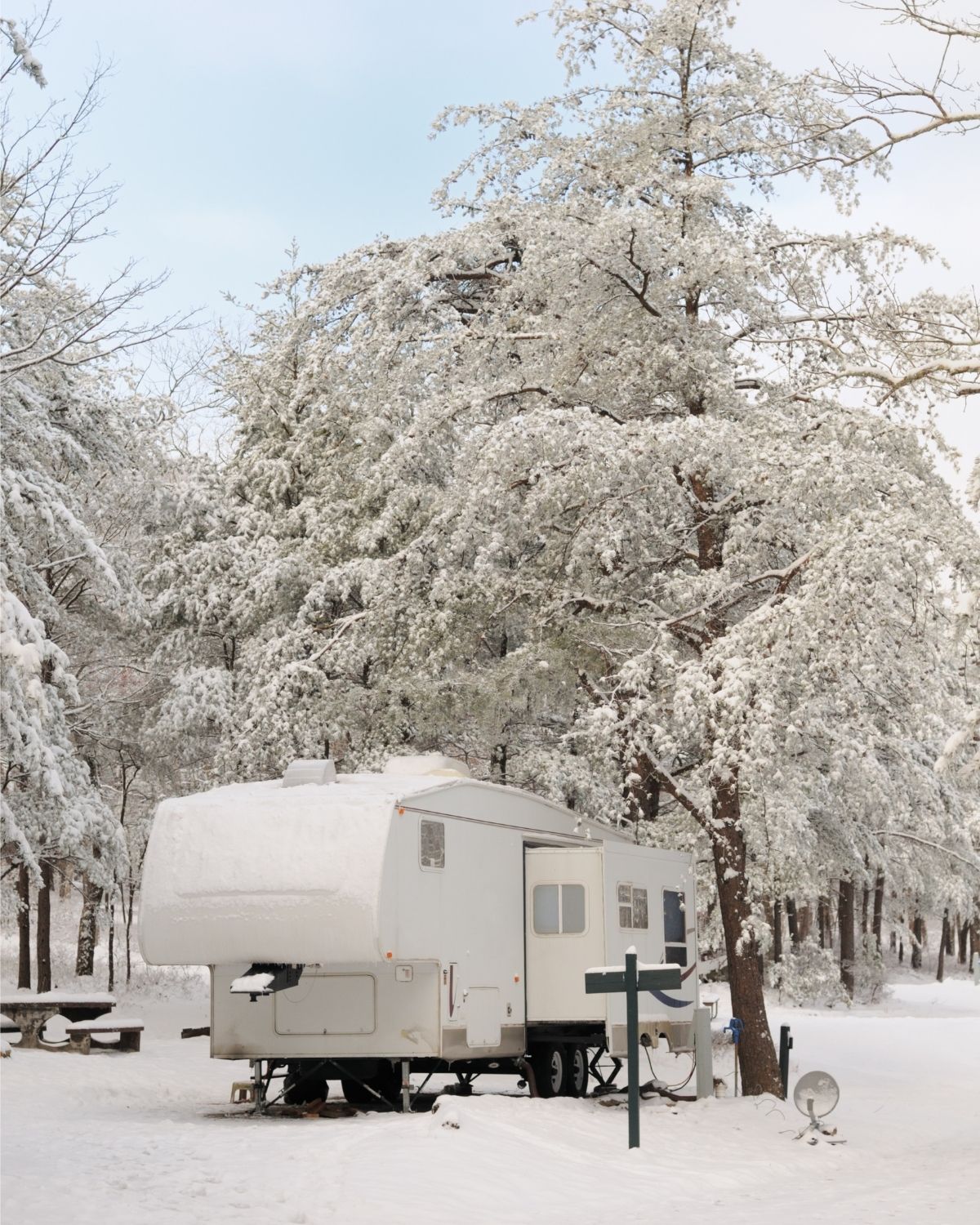

Great article! Wanted to share our solution after spending a full day of vacation trying to use a campsites public WiFi and trying to set up a VPN for security purposes. I burned a whole day!
Frustrated I went to Verizon and signed up for a router called a Cube. Took it back to the RV, plugged it in, looked at the address, user Id and password printed on the side of the cube, and was able to stream movies perfectly and securely.
We traveled over 3states without a blip! It’s awesome you as you don’t have to log into the camp Wi-Fi, it’s secure and the cost is an additional phone line on Verizon so $25 per month plus taxes. I am also able to put it on hold at times, with limitations(3 months) then I have to reinstatement for awhile before being able to use “hold” again.
I’m not sure if we just happened to get the cube on a special but it’s only cost us $25 per month.
Good luck with other options but I sure love the cube!
I am looking for a wifi system that is not hotspot but can provide good wifi for the majority of where we travel. It would be used for primary wifi for work and tv streaming. What is your recommendation? Equipment cost is not a major issue but would like to keep the monthly fee within a reasonable amount. We currently use Verizon as our carrier. We drive a class A and work remotely doing heavy computer audio and video work.
Was very helpful, thank you.
Hi guys! Thanks for the post. I have some questions that maybe you can answer… I’m not from the US but plan a big road trip in my van in the whole of South and Central America. I work as a digital nomad and need wifi on the road.. can you recommend any solutions?
I’m trying to find answers online but feel like it’s a jungle! Thanks a lot :)
I found the read very easy to understand, thank you so much!!
I’m excited about SpaceX too.